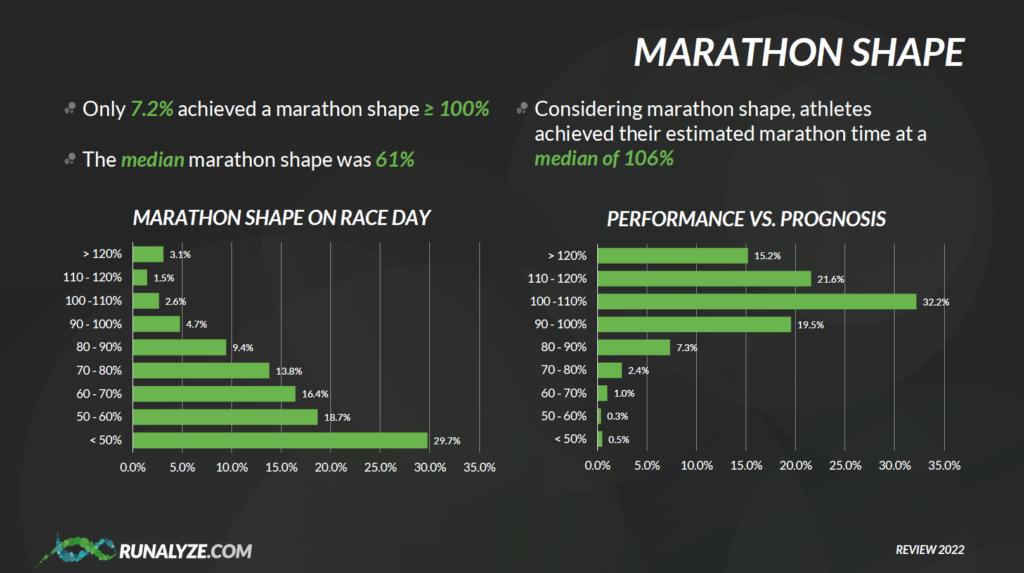A recent study by Feely et. al. examined a dataset of approximately 300,000 marathon runners (2014 – 2017) to determine what effect a break in training in immediate preparation had on marathon time. The result: A longer training interruption of at least 7 days without activity leads to a 5-8% slower marathon time. Reason enough for us to take a look at it based on our marathon shape.
Unlike the vast majority of metrics used in Runalyze, marathon shape has no scientific background. It was created by us to correct the often too optimistic marathon prognosis. The fact that a half marathon in 1:40 corresponds to a marathon in about 3:28 is only true if you have prepared yourself optimally for the marathon distance. Whether this is the case and what a realistic marathon time looks like otherwise is revealed by the marathon shape that can only be found in Runalyze.
The marathon shape is calculated based on weekly mileage and long runs
To determine the marathon shape, the weekly mileage and the long runs are considered. Normally, the last 26 weeks (for weekly mileage) and the last 10 weeks (for long runs) are taken into account. The specifications for the required weekly mileage and long runs are derived from typical marathon training plans and, of course, depend on the effective VO2max or the optimal marathon time.
The loss of an entire training week leads to a 1-3% worse prognosis
In this model, we can easily simulate the absence of one week of training; we effectively cancel the kilometers of one week as well as one long run. Otherwise, we assume that the requirements for an optimal marathon are exactly met. Since the long runs are weighted by date, the result depends on which training week is cancelled. Depending on whether the cancellation is 3 or 10 weeks before the marathon, the marathon shape drops by 3-8%. For the predicted final time, this results in a 1-3% worse time, with the loss being greatest for faster runners.

Performance level and worse training after the break are not taken into account.
Of course, it should be noted that this theoretical calculation does not take into account that the performance level has usually deteriorated due to the break and that athletes are usually not able to run full distances again directly after a one-week break. In addition, training interruptions of 7 to 13 days are considered together in the study. With a 13-day break, even our marathon form model already provides a prognosis that is up to 5% worse.
It should also be noted that the theoretical performance level of the athletes is not known at the time of the study. The marathon times achieved are simply compared with each other, even if the performance status may have been completely different. A better form due to the completed training, experience, age, … – there are many possible reasons for a better or worse marathon time. (Although, thanks to the large sample size, this probably won’t have much effect as long as there are no systematic differences).
Marathon shape leads to a significantly better prognosis
In addition, we would like to share the following slide from our 2022 Year in Review. For this, we examined the marathons of our athletes in the past year and had to determine that according to our marathon shape model, only 7% were optimally prepared for the marathon. The result: On median, the athletes were almost 10% slower* than possible in the optimal case (not on the chart). Taking into account the marathon shape, on the other hand, the marathon prediction was achieved at a median of 106% (i.e. even slightly faster than predicted).
* “Slower” is not quite correct here, because the Effective VO2max of the marathon was considered. Expressed as a percentage, however, this value is very similar to the percentage value of the marathon time.

So marathon shape does what it is supposed to do: It significantly improves the prognosis.
[1] Feely C, Smyth B, Caulfield B and Lawlor A (2023) Estimating the cost of training disruptions on marathon performance. Front. Sports Act. Living 4:1096124. doi: 10.3389/fspor.2022.1096124


